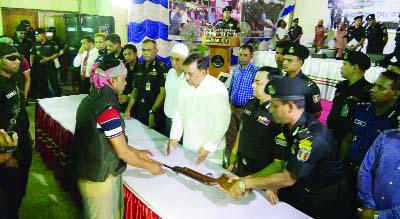
Barisal Correspondent :
Participants at a human chain in Barisal on Sunday demanded transparencies and accountabilities in allotment, distribution and using climate change fund and focusing issues.
They also called to confront the climate change issue as one of the biggest threats against human rights, justice and national security in Bangladesh in international level.
Speakers of that programme held in front of Ashwini Kumar Hall of the city was organised by Barisal Unit of Conscious Citizen Committee (CCC), local unit of Transparency International Bangladesh (TIB).
It was presided over by Barisal CCC former president Prof. M Moazzem Hussain and addressed among others by Shah Sajeda, Henery Swapan, Rafikul Alam, Ranjit Datta, Lincon Bayen, environment, human rights and development organisation activists. They speakers noticed that global warming has been threatening all human rights and securities in Bangladesh which are designed to prevent destruction of life, health, education, property, livelihood, culture, means of subsistence, residence, movement, migration etc.
The effects and threats from climate change in Bangladesh include devastating hazards of deaths and dangers from cyclone, storm, flood, water logging, drought and desertification process, earthquake, river siltation and erosion, sea level rise, unusual changes in weather, changing bio-diversity and ecological balance and impacts on agriculture and food production, the speakers told. Due to climate change effects various diseases spreading among the human and animal being, plants, causing deforestations, destruction of water resources and supplies, they added.
Inability to live and sustain lives forced displacements or migrations of tens and thousands of people through out Bangladesh due to effects and threats from climate change as the coping capacity remains limited due to the relatively poor physical infrastructure and less financial abilities, the participants observed. Thus climate change effects also forcing displacements or migrations of tens and thousands of people and so the legitimate rights of climate refugees should be recognized, the participants urged.
The speakers stressing on climate justice and rehabilitation of climate refugees said any development plan in the region must be sustainable, eco-friendly, helpful for maintaining bio-diversity.
Participants at a human chain in Barisal on Sunday demanded transparencies and accountabilities in allotment, distribution and using climate change fund and focusing issues.
They also called to confront the climate change issue as one of the biggest threats against human rights, justice and national security in Bangladesh in international level.
Speakers of that programme held in front of Ashwini Kumar Hall of the city was organised by Barisal Unit of Conscious Citizen Committee (CCC), local unit of Transparency International Bangladesh (TIB).
It was presided over by Barisal CCC former president Prof. M Moazzem Hussain and addressed among others by Shah Sajeda, Henery Swapan, Rafikul Alam, Ranjit Datta, Lincon Bayen, environment, human rights and development organisation activists. They speakers noticed that global warming has been threatening all human rights and securities in Bangladesh which are designed to prevent destruction of life, health, education, property, livelihood, culture, means of subsistence, residence, movement, migration etc.
The effects and threats from climate change in Bangladesh include devastating hazards of deaths and dangers from cyclone, storm, flood, water logging, drought and desertification process, earthquake, river siltation and erosion, sea level rise, unusual changes in weather, changing bio-diversity and ecological balance and impacts on agriculture and food production, the speakers told. Due to climate change effects various diseases spreading among the human and animal being, plants, causing deforestations, destruction of water resources and supplies, they added.
Inability to live and sustain lives forced displacements or migrations of tens and thousands of people through out Bangladesh due to effects and threats from climate change as the coping capacity remains limited due to the relatively poor physical infrastructure and less financial abilities, the participants observed. Thus climate change effects also forcing displacements or migrations of tens and thousands of people and so the legitimate rights of climate refugees should be recognized, the participants urged.
The speakers stressing on climate justice and rehabilitation of climate refugees said any development plan in the region must be sustainable, eco-friendly, helpful for maintaining bio-diversity.

